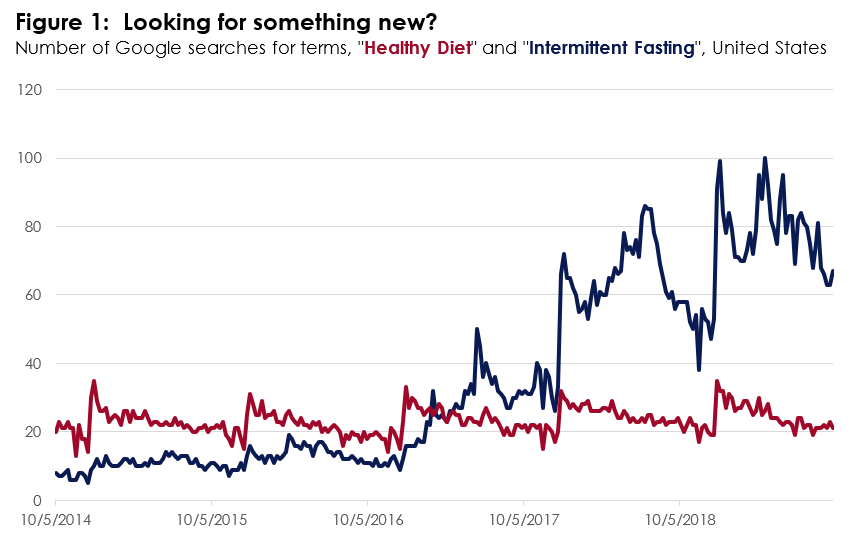Intermittent Fasting
Be honest. Have you given some thought to trying Intermittent Fasting (IF) in hopes of becoming leaner, stronger, and faster? Caveat emptor. While mice may find IF reduces obesity and related medical problems, results for humans are a little more complicated, less clear, and more research is definitely required before any definitive statements can be made. Despite a lack of scientific consensus, there is quite a bit of research on the subject and the story of IF is worth exploring. As is my preferred trademark, I like to begin with the end in mind; despite messaging by the latest diet influencers on social media, fasting is not the golden way to improve performance and health. Remember the well-balanced, nutrient-dense diet? It still wins. But, if you are going to try IF, you should definitely read this, and you should definitely consult with a nutrition expert such as a board-certified sports dietitian or a medical expert before you embark on something that could actually be, quite unhealthy for you, depending on your personal circumstances, training requirements, goals, and medical history.
When I introduce myself as a performance dietitian, the next question that typically follows is “So……what do you think of _______ diet!?” In the last few months, that diet in question is Intermittent Fasting. While many would characterize IF as more of a behavior than a diet, we can think of IF in diet terms with different categories. Patterson and Sears[i] characterize several different types of IF in their review on this subject. For simplicity, I’ve modified their categories and just describe the four presented below, with the primary focus on the second type, which includes the very popular 5:2 diet.
| Fasting Type | Explanation |
| Complete alternate day fasting | Alternate between fasting and eating days. How many eating days between fasting days seems to be variable and author dependent. |
|
Modified fasting or the popular 5:2 diet |
5 days of eating normal, 2 days of eating only about 20-25% of needs or approximately 500 kcals |
| Time-restricted | Fasting intervals vary . For example, fasting after 5pm. |
| Religious fasting | Undertaken for religious or spiritual purposes. From a metabolic standpoint these are often “time-restricted” of varying lengths. |
The term “Intermittent Fasting” refers to the intentional actions of a person to restrict the food they eat for a period of time. IF has been practiced for centuries, often for religious reasons (think fasting for Ramadan) and has been purported to have many health effects. From a research standpoint, a simple PubMed search of “Intermittent Fasting” studies in the past 10 years returned more than 52,000 results and more than 1000 review studies of human research in the past 5 years alone! From a popularity standpoint, people are searching for information. Figure 1 shows a quick look at the popularity of the search term of “Intermittent Fasting” (blue line) compared with the search term “Healthy Diet” (red line). (An interesting side note: the yearly spikes correspond to those eternal New Year’s resolutions.)

Even with thousands of studies looking at various forms of IF and corresponding health outcomes, several important research constraints exist. Many of the studies use mice for the subjects and you should not generalize effects that you might see in mice to something that would surely happen for you. For studies using human subjects, you’ll find they are often plagued by a very small sample size, use short intervention periods limiting time for an effect to occur, and often focus on chronic disease outcomes and not on athletic performance. Don’t get me wrong though, there is some great research on the topic with a growing supply of positive results that are at least worth scientific consideration.
IF for athletes?
So, what about IF and athletic performance? In my experience, I tend to see three types of athletes express interest in implementing some sort of IF diet.
Religious Fasting
First, athletes with religious fasting requirements. For example, I worked closely with several Islamic athletes fasting during the day for Ramadan. We modified training, following hydration status, watched weight loss (we didn’t see any) and experienced what the research shows– that athletic performance is only minimally affected by this type of IF. If this is you, the importance of having a good coach is paramount. A good coach will work closely with an athlete to adjust workout duration and intensity to meet goals and avoid severe caloric deficits during long bouts of exercise in a fasted state.
Fasting for Weight loss
The second type of athlete is one targeting weight loss and wants to try IF. Although I don’t personally recommend or use IF as a means to have an athlete lose weight, there is no shortage of folks trying it. Research results show some promise regarding weight loss. However, (and this is very important) the weight loss really is not any better than following a calorie-restricted, nutrient-dense diet. There is an interesting caveat to this and for some people, if you suffer from binge eating tendencies (i.e. you often overeat, finish your plate, eat until overfull), you might be the kind of person that would benefit from IF more than others. The forced calorie restriction (i.e. not eating after, say 7pm) or the 5:2 method, reduce calories enough to produce weight loss. If you are going to try IF as a means for weight loss, you really should consider discussing this with a dietitian. Although we typically prefer other methods for weight loss, a good dietitian will help you to meet your nutrient requirements, address the underlying binge eating behaviors that are a root cause, and hopefully, help you avoid the disruption that an IF diet can cause. This is also a great time to mention that IF, as with any diet, really isn’t a sustainable long term plan. It’s a diet and like any diet, you have to stop doing it at some point–and if you don’t have a plan, that is when the weight returns. Instead, your focus should be on eating healthy, making healthy food choices, and connecting your eating behaviors to your athletic performance.
Training your “systems”?
The last category of athletes uses IF to “train their fat-burning system.” I’ve heard it put 100 different ways, but the premise is always the same. In order for you to become better at burning your stored fat, you force your body to burn fat by exercising in the fasted state. Keep in mind that eating before you exercise supports exercise performance by providing key nutrients for the activity, which puts these two concepts at complete odds. Is one better than the other? Does exercise in the fasted state really enhance one’s ability to better burn or oxidize fats? In a recently published review, Aird, Davies, and Carson[ii] present meta-data on 46 studies looking at the effects of a fasted vs. fed-state on exercise, performance, and metabolism. The authors note a few important connections. First, eating prior to exercise “bolstered” longer distance exercise but had no effect on shorter distances. Additionally, exercise in the fasted state-led to potential beneficial metabolic adaptations. They do note that further research is required to fully understand both acute and chronic physiologic adaptations to exercise in the fasted state. This is exciting data but, as an athlete, you need to understand that exercising in the fasted state may not produce the results you want, may actually hamper your performance, not help it, and that long terms effects have not yet bet evaluated.
The effect of IF on men v. women
Another important area that has not been well established is how IF might affect men and women differently. I wouldn’t be quick to dismiss this important consideration as time and again, as researchers look into how males and females respond to various stimuli, utilize nutrients, produce and metabolize hormones, we find important differences. For more on this topic, you might consider listening to a wonderful TEDx talk by Dr. Stacy Sims [iii] The bottom line: an exercise in a fasted state appears to do something…but, that “something” may not be what you actually want it to do. Interpretation of the science does not suggest we start recommending athletes exercise fasted in hopes of “teaching their bodies to burn fat better.” Certainly, don’t go off and start doing this without input from your coach and/or dietitian. I’d also suggest that exercise in the fasted state not be undertaken without some concern for safety by the athlete and coach. Consultation with a medical professional is prudent to ensure safety. A story comes to mind of a fellow coach’s athlete that went out for a 5-hour (low intensity) bicycle ride after fasting for 24 hours. Somewhere around hour 3, the athlete fainted, injuring themselves and several others in the group.
Final thoughts
A final observation as both a dietitian and endurance athlete coach…both the science and the scientific process seem to always be under attack. Marketing genius, anecdotal evidence, and social media propel often unproven and unstudied activities into the daily lexicon of human behavior. Sports science and nutrition are notorious domains for this problem to emerge. Dieting is a perfect example. Despite a mountain of evidence regarding the composition of a healthy diet, you still find dozens of “non-experts” suggesting a wide range of the “best way” to do things. I suggest you as the reader and athlete remain vigilant, question everything, demand evidence, don’t be shy to try new things, but also try to minimize bias and remain objective.
Got an idea for Dr. Weinstein and the Setting the Record Straight team? Send us an email at [email protected] and if we choose your topic for the next blog post, head coach Chuck Kyle will send you a surprise gift!
————————————
[i] Patterson RE; Sears DD; Metabolic Effects of Intermittent Fasting. Annu Rev Nutr. 2017 Aug 21; 37:371-393. https://www.ncbi.nlm.nih.gov/pubmed/28715993
[ii] Aird TP, Davies RW, Carson BP; Effects of fasted vs fed-state exercise on performance and post-exercise metabolism: A systematic review and meta-analysis. Scand J Med Sci Sports. 2018 May;28(5):1476-1493. https://www.ncbi.nlm.nih.gov/pubmed/29315892
[iii] Available at: https://www.youtube.com/watch?v=e5LYGzKUPlE


